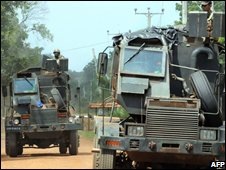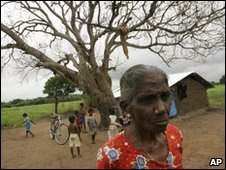 In May 2009 Sri Lanka’s government declared victory in its 26-year war with Tamil Tiger rebels who were fighting for a separate homeland.
In May 2009 Sri Lanka’s government declared victory in its 26-year war with Tamil Tiger rebels who were fighting for a separate homeland.
It was one of the world’s bloodiest and longest-running civil wars and it left parts of the island devastated and displaced hundreds of thousands of people.
On the eve of the first parliamentary election since the war ended, BBC News examines what is at stake for the people of Sri Lanka.
Who are the candidates and what are the issues?
About 7,620 candidates are competing for 225 seats. Out of those, 196 will be elected directly to parliament, with the remainder filled by parties based on their total vote percentages.
President Rajapaksa’s United People’s Freedom Party is seeking to consolidate his political dominance after winning re-election in January against Gen Sarath Fonseka. He is currently in detention but is still competing for a seat in Colombo.
The president hopes to get a two-thirds parliamentary majority, which would allow his party to change the constitution. His coalition currently holds 128 seats in the outgoing parliament and few expect it to face much competition at the polls. The opposition is badly divided since its defeat in January.
Correspondents say that the key issues in the vote will be how to rejuvenate the stagnant economy, unemployment, rural development, how to integrate the minority Tamil community and the fight against corruption.
The expectation is that turnout will be low because this vote comes just three months after the presidential poll.
What about the Tamil vote?
Many Tamil parties are competing in the polls but the BBC’s Anbarasan Ethirajan says that they are mostly disunited. The biggest political grouping, the Tamil National Alliance, is expected to perform well.
The major political parties have made promises in the hope of securing Tamil votes – they make up about 12% of the population.
But none has promised any significant devolution of power to Tamil areas in the north and east of the country.
Meanwhile, tens of thousands of Tamils displaced by the war are still confined to camps in the north. Tamil political parties complain that many of them have not been given proper voter identity cards.
What happens next?
Polls close around 1600 local time on Thursday, 8 April and counting may go on into the weekend because of the large number of candidates and the complexities of the proportional representation system.
Correspondents point out that to some extent the outcome of the vote is academic because the president will continue to wield the lion’s share of political power.
What challenges face the new parliament?
Relief and reconstruction for the parts of the north and east devastated by decades of war will be high on the list.

Areas devastated by the conflict need to be de-mined and rebuilt. Hundreds of thousands of Tamils were displaced in the final stages of the war.
Many of these have now been released but say they need help with rebuilding their homes and with their livelihoods. Those left in camps are eager to be allowed back home.
Then there are the questions regarding a political settlement for minority Tamils.
The forthcoming trial of Sarath Fonseka – whenever that takes place – is also likely to be a hot political potato.
What were the Tamil Tigers fighting for?
The rebels started fighting in the 1970s for a separate state – Eelam – for Tamils in Sri Lanka’s north and east.
They argued that Tamils had been discriminated against by successive majority Sinhalese governments.
The rebels were among the most disciplined and organised guerrilla groups in the world in recent times. They had their own "capital", ground forces, navy and even a rudimentary air force.
They honed the tactic of suicide bombings to deadly effect and became a proscribed terrorist group in many countries.
Have the rebels been eliminated?
The government says the rebels have been crushed. For the first time in decades, the army now controls the whole of Sri Lanka’s territory.
The rebel movement is over as a conventional military force and its leadership has been decimated.
But the Tamil Tigers controlled huge financial and logistical resources, and are supported by many expatriate Tamils around the world.
Analysts say that the manner in which the government pursued victory – ignoring international calls for restraint – may have radicalised a new generation of Tamils, both on the island and in the diaspora in Europe, Asia and North America.
What was the human and economic cost of the war?
The conflict killed well in excess of 70,000 people, displaced hundreds of thousands more and held back the island’s growth and economic development.
(For updates you can share with your friends, follow TNN on Facebook and Twitter )
